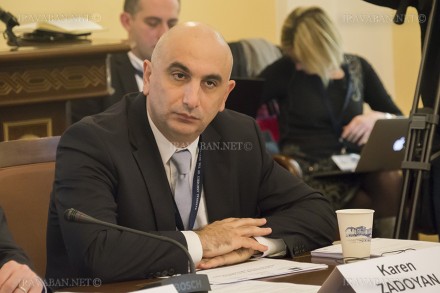Today, during the ordinary session of Euronest Parliamentary Assembly’s Euronest Standing Committees on Political Issues, Human Rights and Democracy Issues a reference was made to the Anti-Corruption Fight. Mr. Karen Zadoyan, the President of the Armenian Young Lawyers Association NGO (AYLA), introduced the “Multifaceted Anti-Corruption Promotion” three-years project supported by the European Commission and implemented by the AYLA in cooperation with the Freedom of Information Center of Armenia NGO.
“The project aims to tackle two important issues: to strengthen the institutional capacity of civil society organizations from the aspect of control and watchdog activities and to influence on the formation of political agenda,” Mr. Zadoyan said.
The project is carried out in three directions: First – to strengthen the anti-corruption monitoring and watchdog capacity of CSOs. In this regard, during the last year 10 trainings were organized for 105 organizations (including the media) in all regions. Local and international experts delivered lectures on the international experience and expertise on fight against corruption, international legal instruments, methodology of public anti-corruption monitoring, experience and mechanisms on the establishment of anti-corruption coalitions and other issues.
The second direction is developing and leading a coalition of CSOs to monitor the anti-corruption aspects of the government’s five-year program and implementation of the justice reforms strategy 2012-2016, and other related documents. An Anti-Corruption Coalition has already been established. Around 70 CSOs from Yerevan and all marzes of the RA are members of the Coalition. The project foresees provision of 20 small grants (2000-3000 Euros each) to the organizations to conduct anti-corruption monitoring activities.
Iravaban.net website has launched a special section of the project which is updated on daily basis publishing articles on corruption problems, analyzes and investigation.
The third direction of the project is developing a dialogue between the Government and CSOs aimed at strengthening the anti-corruption mechanisms. Carl Ulbricht, the International Expert of the project spoke about the priority issues of the project, namely: criminalization of illicit enrichment and establishment of the independent anti-corruption body. The Anti-Corruption Coalition presented its recommendation on these both priorities to the Government. According to the expert, both requirements were derived from the principles of the UN Convention against Corruption and in both cases international experience for their regulation exists, and which can be instructive for us as well.
After the presentation Jaromír Štětina member of the Euronest Parliamentary Assembly from Czech Republic commented that the fight against corruption was not always experiencing positive. He mentioned the Georgian experience where President Saakashvili was fighting against corruption, but the criminal proceedings were instituted against him after his retirement. On his Karen Zadoyan commented that the anti-corruption experience of Georgia is one ofe the best among the six member state of the Eastern Partnership; however the issue of political corruption remained unsolved there. And one of the reasons of failure of the Georgian struggle was that the fight began from the phase of overcoming the administrative corruption, but did not reach its final stage: the phase of overcoming the political corruption. To achieve that it was necessary to develop stable and effective Anti-Corruption Institutional Mechanisms as it was in case of Singapore, by the reformer Prime Minister Lee Kuan Yew.
To MP Artsvik Minasyan’s question about his position on the newly established Anti-Corruption Council formed by the Government, Mr. Zadoyan said that the issue had repeatedly been discussed and stated that the newly developed body should be independent and professional. It had repeatedly been advised to the government that the two allocated to the CSOs places in the Council were not enough and was proposed to extend the number of SCO representatives up to five. However the recommendations were not accepted and thus the newly established Council cannot be considered as participatory. Karen Zadoyan mentioned that today the CSO Anti-Coalition had circulated a statement, which saiys that the Anti-Corruption Coalition will refrain from nominating candidates to take part in the competition for the involvement in the Ant- Corruption Council in this stage. However it will continue its active role in the Anti-Corruption struggle, in particular carrying out independent and professional monitoring of the activities of the newly-established Anti-Corruption Council, and will continue the dialogue with the Government on the assumption of the fact that it is necessary to establish stable and effective anti-corruption institutional mechanisms.
P.S. It is due to mention that in his speech Jaromír Štětina informed that last week he had met with the prominent Armenian businessman Levon Hayrapetyan, who currently is in prison in Russia and promised him to raise th issue at the assembly, which he did.
Iravaban.net































